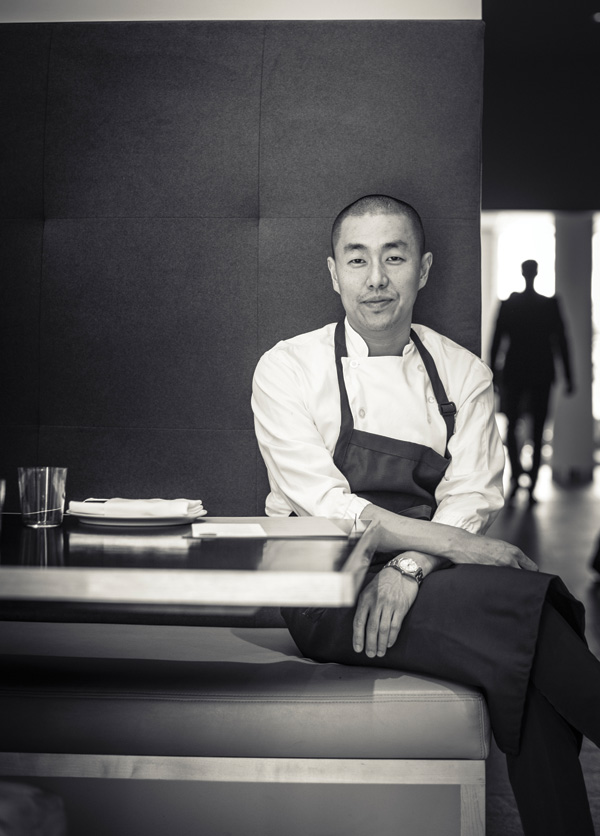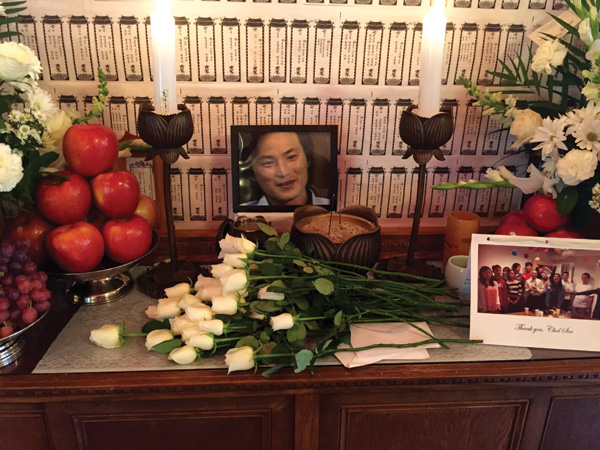by JAMES S. KIM | @james_s_kim
editor@charactermedia.com
The San Francisco Bay Area culinary scene boasts a number of Michelin-starred restaurants, but only four can now claim the highest three-star rating. Benu, which specializes in minimalist fare with Korean and Chinese influences, is one of them.
The restaurant’s chef de cuisine and owner, Corey Lee, knows something about the stars. The 37-year-old has worked at acclaimed restaurants in Europe and served as chef de cuisine at the three-star French Laundry for seven years before opening Benu. Receiving the top rating for Benu in 2015’s Michelin Guide, Lee told KoreAm via email, was “surreal.”
In March 2015, chefs and foodies alike can catch a glimpse into Benu’s history and philosophy through the Benu cookbook. It won’t feature your typical collection of recipes, however. The 256-page book will include 150 photographs and illustrations and is presented as a 33-course tasting menu. Readers will be able to experience not only the making of Benu’s cuisine, but also the inspirations behind it through personally written essays and stories from Lee.
Featuring forewords by Thomas Keller, Lee’s mentor at the French Laundry, and Momofuku chef-founder David Chang, the book also delves into Lee’s culinary and cultural influences from Korea, Hong Kong, Europe and San Francisco.
Lee, who just opened Monsieur Benjamin, a modern take on the casual French bistro that has quickly established itself as a go-to late-night dining option in San Francisco, spoke to KoreAm about his busy year.


The dishes of Benu: sea bass (left) and chicken velvet.
How did you react when you heard in October that Benu had been awarded three Michelin stars?
Corey Lee: It was a surreal moment. I was a bit speechless. For most of my career, Michelin itself was this distinction that was reserved only for European restaurants. Getting Michelin stars as a chef in America was not even possible. In fact, I spent years in Europe so I could experience the kitchen and culture of three-star restaurants. And now, getting three stars at Benu—well, it’s a pretty special thing for me.
Does the third star add or change anything about the way you run your restaurant?
Not really. I always felt we pushed ourselves to be the best restaurant we were capable of running. There’s not much more you can do than that. I think, more than anything, we have to be aware and cognizant of people’s expectations. They’re even higher than they were before, and that can be a double-edged sword.
Image of the Benu cookbook by Phaidon Press.
What can people expect from the Benu cookbook?
I started working on the book in summer 2013. I think it will give readers an inside look into Benu—its influences, operations, background—things you might not know by just dining here.
What are the most important elements to a good cookbook? And what are some examples of your favorite cookbooks?
To learn something. It doesn’t necessarily have to be a recipe or technique; it could be a way of thinking about a menu or the history of a particular dish. If I’m spending the time to read a book, I want to be able to learn something new. My favorite two cookbooks are The Great Chefs of France and Science and Civilisation in China. Neither is a traditional cookbook, but they were probably the most influential to me.
What do you think another top-rated Michelin restaurant has done for San Francisco’s food culture?
I think San Francisco has been a world-class destination for food lovers for quite some time already. Having three-star restaurants in San Francisco just affirms how diverse and exciting the food scene really is in the Bay Area. It’s a good thing for everyone.
Does the Bay Area add any of its own unique culture to the “traditional” three-star experience?
Absolutely. The cliché is that Bay Area restaurants cook seasonally and use the best produce. But at the 3-star level, I think that should be a given no matter where the restaurant is [located]. For me, what makes the Bay Area unique is that there is a distinct casualness to the fine dining. Michelin is about what’s on the plate, not how fancy the dining room is or how formal the service. I think that’s really evidenced here.
For aspiring restaurateurs and chefs, what would you say are the most important components of running a restaurant and kitchen?
Stamina, vision and open-mindedness.
___
Featured photo courtesy of Eric Wolfinger










